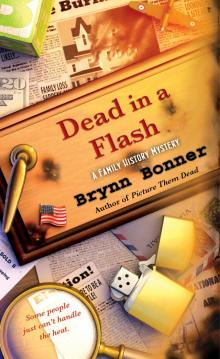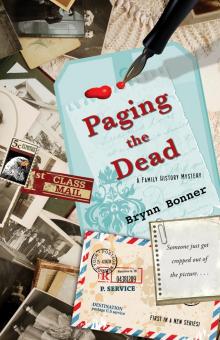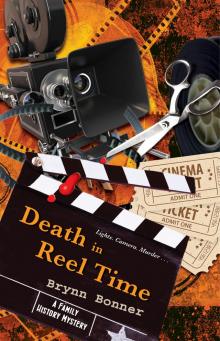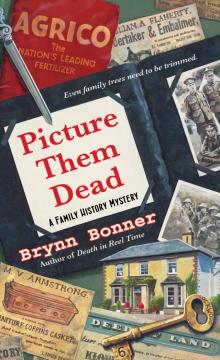- Home
- Brynn Bonner
Picture Them Dead
Picture Them Dead Read online
Praise for Brynn Bonner’s delightful cozy mystery series
DEATH IN REEL TIME
“What seems like a giveaway leads to a surprising climax.”
—Kirkus Reviews
“Several very inconspicuous details are scattered throughout the story, and Brynn Bonner ingeniously brings all the facts together for a shocking conclusion. . . . An inventively cunning mystery.”
—Single Titles
PAGING THE DEAD
Selected as Library Journal’s Mystery Debut of the Month
“Bonner successfully combines an intriguing cast with the promise of an unfolding romance and a spritz of the paranormal in her winning cozy debut.”
—Library Journal (starred review)
“Bonner adds a nice mix of genealogical scrapbooking info and . . . romantic entanglements.”
—Publishers Weekly
“The past and present intriguingly collide. . . . There are plenty of suspects plus loads of clues . . . and some clever humor adds to the entertainment.”
—Single Titles
“Engaging and touching. . . . Goes beneath the surface of family trees, and gets to the roots of relationships.”
—Mystery Scene
Thank you for downloading this Pocket Books eBook.
* * *
Sign up for our newsletter and receive special offers, access to bonus content, and info on the latest new releases and other great eBooks from Pocket Books and Simon & Schuster.
CLICK HERE TO SIGN UP
or visit us online to sign up at
eBookNews.SimonandSchuster.com
To Adeline and August,
the apples of my eye
acknowledgments
Many thanks to my friend Wilma Romatz for sharing the story that inspired this one.
To Dr. Billy Oliver for information on burial practices and laws. Any errors in how his information was applied in this story are strictly my own.
To Margaret Maron for the title.
And to my family, always.
one
Thunderstruck.
That was my grandmother’s word for when a person is so stunned, it renders her slack-jawed and mute. I haven’t experienced this many times in my life, as I’m a decidedly sanguine person, but at the moment, I was definitely thunderstruck.
As a professional genealogist, I’ve seen enough skeletons come dancing out of family closets to get an impressive conga line forming. But they’ve all been metaphorical skeletons. Until today.
I stood on a berm of red dirt in our potential new client’s backyard, only a few miles from where I live in Morningside, North Carolina. I stared down into the hole the backhoe had ripped, and even though I’d been warned, I was shocked senseless. There was a skull grinning up at me, and while this was disconcerting enough, what really got me was the casket. It was made of glass in a milky green color and was broken in multiple places, the shards sticking out like spikes. The metal hinges were rusted and twisted and what was left of the lid had slid to the side. Tatters of rotted fabric sprouted from the pile of wreckage like desiccated seaweed. A jagged hole where the backhoe’s scooper had hit left a handy window for our macabre game of peekaboo with the grinning skull. The whole casket had settled wonky. It canted to one side as if the occupant had rolled over in his big sleep and taken the casket with him.
“Dear sweet Lord, have mercy,” my business partner, Esme Sabatier, whispered.
For the first time in weeks, she and I were in total agreement.
Esme’s been my cohort in our genealogy research business for several years, but more than that, she’s my housemate, my confidant, and my dearest friend. She’s my family. We’re great partners because we have complementary outlooks and skills. But the sprockets on gears are complementary, too, and if they don’t line up just right, there’s a lot of grinding. We’d been out of alignment lately.
This weird casket and its tenant were the most disturbing things Esme and I had witnessed today, but not the only jolt we’d had. We’d been snug in our beds this morning, minding our own business and trying to recover the sleep we’d lost over the past two weeks while on a job for a big Italian family in Maryland. We’d gotten in late last night, so exhausted we’d dumped our suitcases in the front hall and gone straight to bed.
A little after 8:00 a.m., which to my sleep-deprived brain was an ungodly hour, someone started mashing on our doorbell. I’d put my pillow over my head, but it didn’t let up. Defeated, I’d hauled out and trudged downstairs, muttering old Sicilian curses I’d recently learned at whoever was leaning on the bell. I threw the door open to find Jennifer Jeffers standing on our front porch.
Jennifer is the last person in the entire population of our little town who would pay a social call on Esme and me. She dislikes us—rather intensely—for some reason neither of us can fathom. True, we hadn’t met under the best of circumstances. Three years ago, one of our clients had been murdered, and for a brief time, Esme and I were deemed persons of interest since we’d been among the last to see her alive. Jennifer and her partner, Denny, had been the detectives on the case and had come to question us. We were quickly cleared, so I couldn’t see why Jennifer would still hold that incident against us. Denny certainly hadn’t. As soon as they’d eliminated us as suspects, Esme had become a person of immense interest to Denny.
But Jennifer is still so unfriendly toward us. We’ve tried being sweet to her, we’ve tried giving as good as we got from her, and we’ve tried analyzing every interaction with her to see if we could get any insight into the problem. Nothing had gotten us any closer to understanding what we’d done to offend her so much. These days, we did our best to ignore her.
Jennifer’s the youngest person ever to make detective in the police department, and quite the overachiever. Her partner, Denton Carlson, is Esme’s boyfriend, though that sounds like a silly term when you know them both. Esme is a beautiful Creole woman in her fifties and she’s substantial and statuesque—over six feet tall in her stocking feet and fond of heels. Denny is the same age and is a Mack truck of a man. They are a formidable-looking pair.
I, on the other hand, am short and small, much like Jennifer Jeffers. When we’d first met, I’d had the brief idea we had some short-girl solidarity going, but she soon disabused me of that notion.
So, to see her standing on our front porch in off-duty clothes was a surprise. And what came out of her mouth after I gave her a puzzled hello was even more surprising.
“Hello, Sophreena. I hate to ask this, but I need your help. And Esme’s.”
I stood for a moment trying to process what she’d said, thinking I must still be sleeping and that this was a dream, or a nightmare ramping up.
“It’s not for me, it’s for my dad,” she said when I didn’t respond.
“And what is it we can do for you, or him, exactly?” I asked hesitantly.
“It’ll take some explaining,” Jenny said.
“Oh, okay,” I said, opening the door wider. “Come in. Would you like some coffee? I sure would.”
“No, thanks,” Jenny said, clearly uncomfortable.
As we went into the kitchen, I could hear Esme muttering as she descended from the mother-in-law suite on her side of the house.
“Who was that mashing that doorbell so early in the morning? Don’t they have any—” She halted mid-grumble at the bottom of the steps and reared back as if a sudden wind had pushed against her when she caught sight of Jenny. She looked to me for an explanation.
“Jenny needs our help,” I announced, raising my eyebrows as I turned to flip on the coffeemaker. “Or her fath
er does. She was just getting ready to tell me about it.”
“Is that so,” Esme said, moving to the cupboard to get mugs and simultaneously giving me What the hell? eyes. “Well, let’s hear about it.”
“Have a seat,” I said, turning back to Jenny. She stood, shifting her weight from one foot to the other, looking like she’d rather be getting a root canal.
“That’s okay, this won’t take long,” she said. “I need to get back to my dad.”
We waited, enshrouded in what had to be the most awkward silence ever, until the coffeepot gurgled and Esme snatched it up and poured. “You sure you don’t want a cup?” I asked Jenny.
“Fine, if it will speed this up, I’ll take one,” Jenny said, taking the cup from Esme, who, with uncharacteristic ungraciousness, held it out only slightly, making Jenny come get it.
“Now, what’s this about?” Esme asked as she settled at the table, making a fuss of rearranging the cream pitcher and sugar bowl.
Jenny took a deep breath and let the words explode from her mouth. “My dad bought a new place a few months ago, just outside town—the old Harper place. It’s an old farmhouse and a five-acre plot of land. He’s doing a lot of work on the property, wants to put in a big vegetable garden and a bunch of other stuff. It’s this permaculture thing he’s into. This morning he was using a Bobcat, you know what that is, right? One of those mini-bulldozer deals?”
I nodded. Esme rolled her eyes.
Jennifer’s nostrils flared, but she went on. “Anyhow, he was excavating to put in a water feature and he hit something. He thought it was a rock but when he couldn’t get the bucket loose, he went to investigate. It’s a coffin, a weird coffin. Made out of glass. There was no grave marker, and there was no disclosure about anybody being buried on the property. He wants to talk to you two about it.”
“Why us?” I asked.
Jenny shrugged and took a sip of her coffee, examining the brew as if she suspected it might be poisoned. “Don’t know,” she said. “He just wanted me to ask if you’d come out and take a look.”
And so we did. You can’t dangle the words glass coffin in front of genealogists without arousing a certain level of curiosity.
Meeting Jennifer’s dad was yet another surprise for the day. He wasn’t at all what I’d expected. Jennifer is a straitlaced gal, conservative in dress, measured in her movements, and taciturn in speech. She’s very self-contained.
River Valley Jeffers was not an uptight gentleman. He greeted us when we got out of Esme’s SUV with an extended hand and a doff of his gimme cap. “Jenny’s inside making some calls,” he said. “She’s trying to figure out what needs to be done from the official side.”
He had a two-day scruff of whiskers and was dressed in well-worn blue jeans and an old Pink Floyd T-shirt, topped with a flannel jacket that looked soft from many washings. His gray hair was pulled back in a braid that hung a few inches down his back and the fan of wrinkles around his eyes documented a lot of time spent laughing.
“Jenny’s talked so much about you two and how good you are at finding out things that happened years ago, I thought you’d be the ones to help me figure out who my mystery man is.” He turned and pointed to a pile of dirt at the top of a gradually sloping acre of side yard and gestured for us to follow him.
“Maybe Jennifer’s adopted,” Esme whispered out of the side of her mouth.
“I feel bad about disturbing this fella’s eternal rest,” River went on. “Least I’m assuming it’s a fella; kinda looks like he was wearing a suit coat when he went to meet St. Peter.”
“And the coffin is actually glass?” I asked. “I’ve heard of those but never actually seen one. Have you?” I asked, turning to Esme, who didn’t reply.
“Have you, Esme?” I asked again.
“No, sorry,” Esme said. “I was still stuck on Jennifer saying you and I are good at what we do.” She turned to River. “Is that really what she said?”
He nodded. “All the time. But listen, I’m not asking for a favor or anything. I want to hire you to look into this. I’ve wanted to know more about the history of this place anyhow, and now that I’ve gone and plowed up what I’m assuming is a family member of the folks who lived on this land, I feel like I really need to know more. Maybe he’s got companions up there on that hill.”
“Well,” I said, “let’s see what we’ve got here and we can talk more later if we think we can be of help.”
Picking our way along the newly turned dirt where River was putting in not only a vegetable garden but also trees, flower beds, and an elaborate trellis structure was slowgoing. Esme, as was her wont, had worn high heels, this pair in a leopard-skin design and completely inappropriate for the terrain. She kept sinking into the loose earth and then having to extricate her footwear. As we walked, Jennifer came from the direction of the house and fell into step with us.
Arriving at the hole, we stood around the grave, a peculiar party of mourners, staring down at a stranger who seemed to be staring back, mocking us from his ruptured glass casket. After I finally got my wits about me, I looked away from the skull and began studying the characteristics of the casket. The glass was opaque in a color that reminded me of old green Coke bottles marbled with ivory veining. There was no burial vault, so the grave was likely an old one.
“You got everything all sorted out?” River asked Jennifer. “Is somebody going to come get him?”
She sighed. “I’m not sure. I keep getting passed from one authority to another. I’m having trouble getting to the proper people on this.”
Something about the look on Jennifer’s face made me feel bad for her. It was as if she felt she’d failed her father.
“I’m not sure I’d know who to call either,” I put in, trying to make her feel better. “I’ve dealt with old graves before in family cemeteries, but they were always marked and registered. This seems like a job for maybe a crime analyst.”
“We don’t even know who this is, or how he died, or how long he’s been here. Where’s the crime?” Jenny snapped, then muttered under her breath as she turned to glare at Esme’s feet. “Other than those shoes.”
I watched Esme’s face twist into a murderous glare.
“Jenny, darlin’,” River said, reaching over to pat her back. “We’ve got enough negative energy here right now. Be sweet like your mama taught you.”
Esme opened her mouth, no doubt to express the opinion that Jenny’s mother had failed miserably, but I rushed to cut in.
“As I understand it from Jennifer, you weren’t told about a grave on the property when you bought the place, right?”
“Right, nothing was said about it,” River said. “I bought the place about six months ago when the lady who owned it had to go into a nursing home. I dealt with her lawyer; never met her. She must have been a good ol’ gal, though. I understand she made a nice contribution to the Literacy Council when she sold the land.”
“Claire Calvert, the head of the Literacy Council, lives just over there,” Esme said, nodding her head in the direction of the rise beyond the open grave. “Maybe she scored a convert.”
“Claire could talk you into funding a program to teach rocks to read,” River said. “But she was pretty surprised about that particular contribution. She says she and the lady were neighborly enough, but not close.”
“Would you mind letting me review your deed and title?” I asked.
“Glad to. It’s not an imperfect deed, if that’s what you’re thinking. I’ve got a crackerjack real estate lawyer. But the papers are in my safe-deposit box, so I can’t get to them until Monday.”
We all looked up as a van came down the long gravel driveway, kicking up a cloud of red dust.
“Finally,” Jennifer said. “That’s the medical examiner.” She marched off toward the van while Esme and I turned our attention back to the casket. “The glass is pretty
if you can get over what it is,” Esme said, tilting her head to one side.
“It is, isn’t it? It’s very ornate,” I said. “And it must have been expensive. Whoever this was must have been highly regarded. I wonder why there’s no marker.”
“It’s possible there was a gravestone at one time and it got destroyed,” River said, glancing around. “We’re too high on the hill for flooding, but we’ve had plenty of big storms come through this area over the years.”
Jennifer walked back with a guy who looked all of twelve. He was red-haired and freckled and so slight he was having difficulty with his heavy case of supplies. When he got to the edge of the grave he looked down and gushed, “Wow, way cool!”
“This is Josh,” Jennifer said with barely disguised disdain. “He’s interning with the medical examiner’s office.”
“They sent a flunky,” Esme whispered in my ear. “Guess Jennifer doesn’t have much juice.”
I shushed her, but she had a point.
“It’s not cool,” River said gently, “it’s disturbing.”
“Oh, sure,” Josh said. “I just meant I never saw a glass coffin before. I’m supposed to take some photos and measurements.”
“It’s not a coffin,” I said, hardly aware I was speaking. “A coffin has six or eight sides and is wider at the top, shaped more like a body. A casket is a rectangular box. This is a casket.”
“Interesting,” River said. “But whatever he’s housed in, are you going to arrange to have this—him,” River corrected, “disinterred and moved someplace?”
“Don’t know if we can,” Josh said. “There’re all these burial laws and stuff. Somebody way above my pay grade’s looking into all that.”
“And in the meantime,” Jennifer said sharply, “what’s my father supposed to do?”
“Nothing.” Josh shrugged. “We’re not supposed to touch anything or do any more damage. I’ll cover the hole with a tarp when I’m done, and then you wait for the big enchiladas to get in touch.” He set his case on the ground and squatted to release the latches. “Now, if y’all would step back, I’ll get to work.”

 Dead in a Flash
Dead in a Flash Paging the Dead
Paging the Dead Death in Reel Time
Death in Reel Time Picture Them Dead
Picture Them Dead